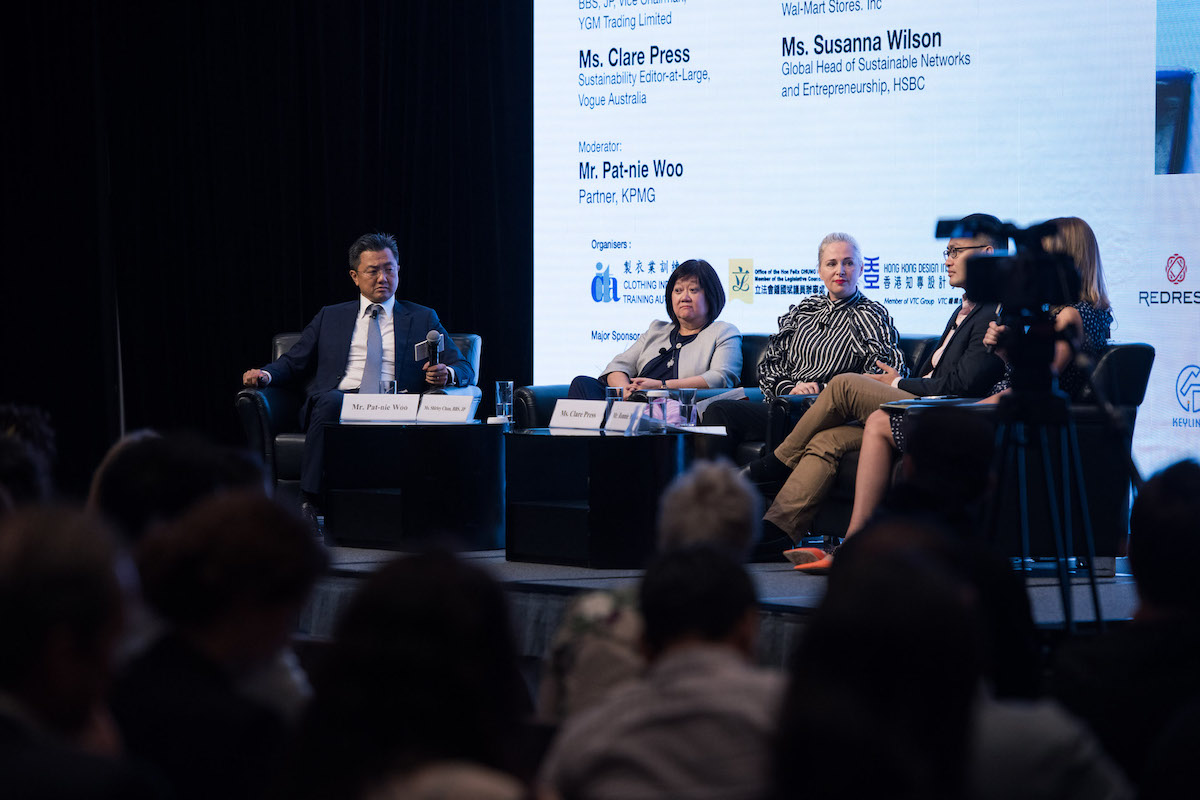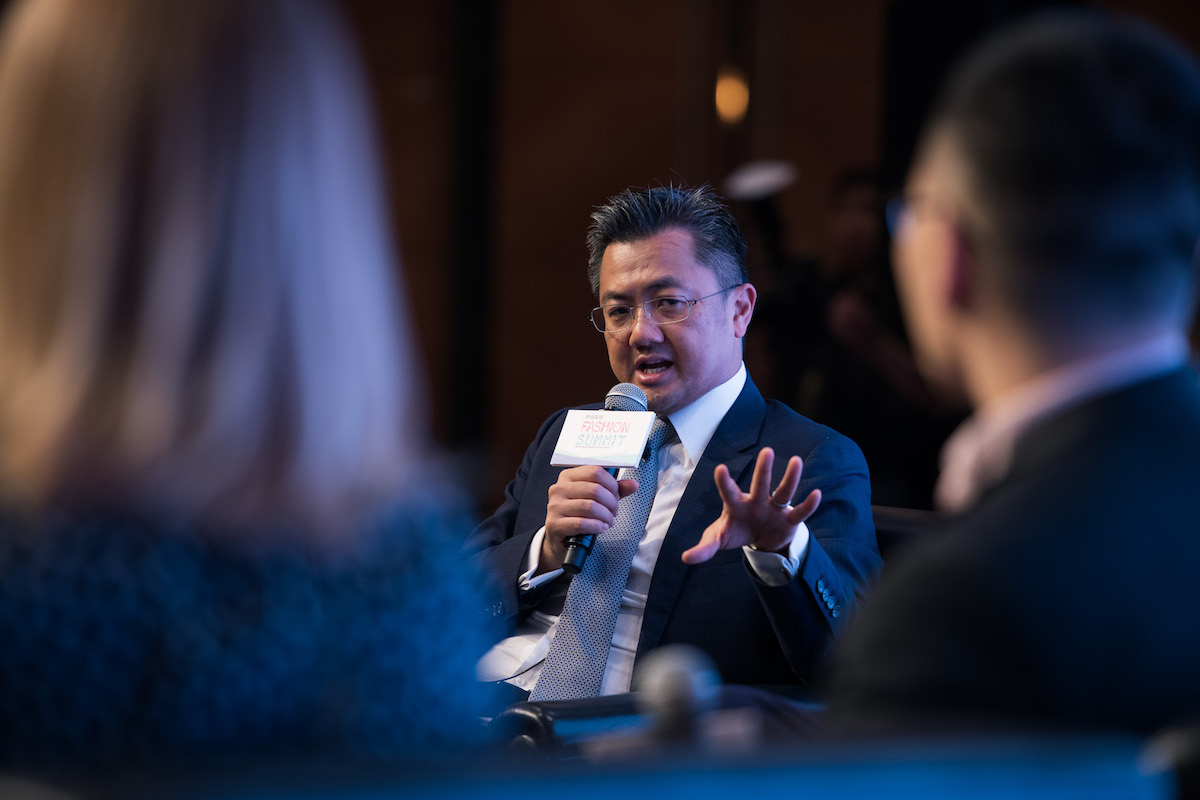Corporate Social Responsibility Report
Corporate Social
Responsibility Report
Pat Nie Woo, Partner, Head of Corporate Social Responsibility at KPMG China, has a passion for helping businesses become more sustainable. After more than seven years with KPMG, the Institute member left the firm in late 2004 to join his family’s company, a supply chain and textile business, where he explored and developed his knowledge of sustainable development. He since returned to the firm, where today, he is a member of the China Steering Committee on Climate Change and Sustainability (CC&S) and a member of the KPMG Global CC&S network. In this picture, Pat moderates a panel discussion on global sustainable consumption during Fashion Summit 2018 at the Hong Kong
Convention and Exhibition Centre.
+
The Institute takes corporate social responsibility seriously. It focuses on incorporating social and environmental considerations into its business operations to achieve sustainable development for the organization, staff and society as a whole. With platforms and key initiatives, the Institute mobilizes and empowers its members to contribute to the wider community.
Community involvement
This year, with the help of the Branding and Communication Advisory Panel, the Institute set up the Community Services Working Group (CSWG). The group aims to advise the panel on developing social service and charity activities for the Institute, allowing members to utilize their professional knowledge and expertise in a meaningful way.
New and existing corporate social responsibility programmes reflect the Institute’s commitment to good corporate citizenship. Throughout the year, members gave back to the community by voluntarily contributing to various projects and activities.
Members also actively participated in a wide range of external charity events such as the Oxfam Trailwalker and UNICEF 3km Leadership Challenge.
CPA for NGO: promoting best corporate governance in NGOs
We advocate best governance practices to board members of NGOs through our CPA for NGO progamme. In August 2017, the programme launched a six-month pilot run of a pro-bono advisory service, pairing Accountant Ambassadors with small NGOs to offer professional advice on accounting, governance and risk management. Induction sessions were held on 6 and 22 September 2017 for the 26 Accountant Ambassadors to meet with nine NGO representatives.
Supporting external organizations
As an extension to our CPA for NGO social responsibility programme, we proudly support The Hong Kong Council of Social Service’s (HKCSS) NGO Governance Platform Project as its sole strategic partner. This year, the Institute’s president, vice-presidents, Chairman of the CSWG and Accountant Ambassadors took part in the fourth, fifth and sixth NGO Directors’ Luncheons, and met over 110 board members and agency heads from 46 NGOs. The fourth luncheon was particularly well-attended by six local charities including Lok Sin Tong, Po Leung Kuk, Pok Oi Hospital, Tung Wah Group of Hospitals, Yan Chai Hospital and Yan Oi Tong. The series of luncheons successfully assisted over 300 board members from around 130 NGOs, who receive lump-sum grants from the Social Welfare Department.
Also as part of the programme, 20 Accountant Ambassadors facilitated case studies at a lunch seminar on “Financial Reporting 101” in June 2018 for more than 90 partners of the Arts Capacity Development Funding Scheme and Hong Kong Church Network for the Poor.
Jointly with the HKCSS, we launched the “Treasurers’ Club” initiative last year, aimed at equipping treasurers with relevant knowledge in governance, financial reporting, risk management and financial projection, among others, through workshops facilitated by our Accountant Ambassadors. Almost 25 Accountant Ambassadors were facilitators for the series of six workshops.

Rich Kid, Poor Kid: encouraging financial responsibility in Hong Kong’s children
The Institute’s “Rich Kid, Poor Kid” programme involves CPAs visiting primary and secondary schools throughout Hong Kong to instil good money management in young people.
From July 2017 to June 2018, 11,000 primary and secondary school students were taught by the Institute’s Accountant Ambassadors over 62 sessions, and learned basic money management skills.
This year, we participated in “Money Month 2018,” organized by the Investor Education Centre. As part of the event, 52 parents and 63 children took part in a “Rich Kid, Poor Kid” family storytelling session and learned about money management through listening to the May Moon story about a young girl May Moon applying the money and ethics lessons learned from CPAs to save her personal and family finances, and the world economy.
In an extension to our pursuit to nurturing future generations, the Institute co-organized a career talk with Caritas School Social Work Service for some 250 secondary school students. Accountant Ambassadors from sectors including in business, in practice, charity and from a regulatory body were the speakers. The Accountant Ambassadors shared their working experience and tips on job interviews. Investing in the city’s future, we continued to support the government’s “Future Stars” programme through the HKICPA Charitable Fund. We sponsored 12 scholarships for secondary school students from less privileged backgrounds to encourage them to achieve upward social mobility.
A sustainable Institute
As well as our external activities, the Institute ensures it acts as a responsible body through various internal actions.
Use of resources
Steps have been taken to apply energy-saving and sustainability measures and minimize the Institute’s carbon footprint throughout its offices.
Energy conservation
To reduce overall power consumption, LED lights have replaced energy-consuming halogen spotlights in several areas, such as the boardroom, conference rooms, VIP rooms, the library, training centre, lift lobby and counter service area.
To meet and maintain the Institute’s long-term energy-saving goals, staff have collectively put in a conscious effort to switch off lights after work and when rooms are not in use. To further reduce energy consumption, we have been using zoning controls to manage lighting.
Paper consumption
The Institute prioritized using electronic copies instead of hard copies, with documents such as leave applications, performance evaluations, salary records and approval of overtime work for staff now prepared and processed digitally. In the financial year of 2017/18, 39,911 members received annual renewal notices by email, compared to 1,926 who received a hard copy by postal mail. The e-renewal system also applied to students, with 17,664 students receiving e-renewal notices while only 126 were sent hard copy notices. Through these efforts, paper usage has been significantly reduced from 121,377 sheets of paper in the previous financial year to 3,852 this financial year for members, and 36,000 sheets in 2015/16 down to 126 sheets this financial year for students.
Waste management
Our recycling facilities collect used plastics such as toner and ink cartridges from printers, and general plastic waste accumulated within the premises.
Wastewater from our pantries and kitchens is also filtered via grease traps before being released into the building’s sewage system and public sewers. The built-up sludge in the traps that could add to our carbon footprint is safely extracted every six to nine months, helping to reduce overall waste. The use of recycled paper and double-sided printing is also practiced throughout our offices.
Green procurement
The Institute uses energy-efficient electrical appliances, recognized by official certification schemes. Before installing new office equipment, we primarily consider products that meet the grade 1 standard of the Hong Kong government’s Electrical Mechanical Services Department efficiency label.
Old printers have also been replaced with models with green initiative features. Old copiers and other used consumables were returned to the Fuji Xerox Integrated Recycling System for Asia-Pacific for processing and reuse. Following this, the Institute received a certificate of appreciation from Fuji Xerox (HK), in support of its zero landfill goal.







